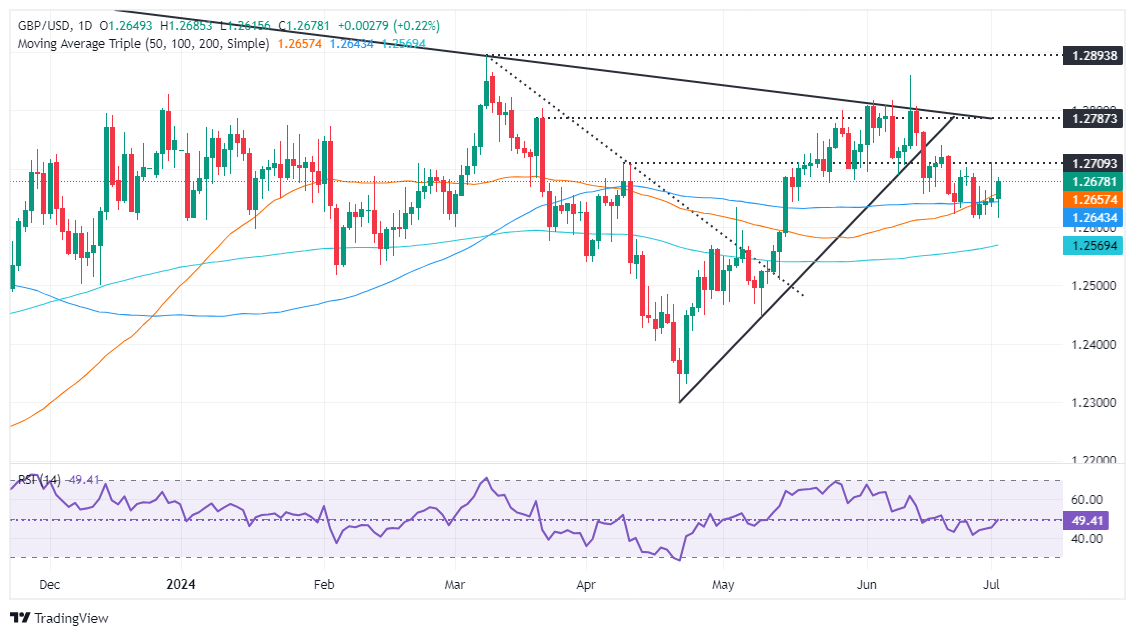- Phân tích
- Tin tức và các công cụ
- Tin tức thị trường
- GBP/USD Price Analysis: Gains despite standing bearish below 1.2700
GBP/USD Price Analysis: Gains despite standing bearish below 1.2700
- GBP/USD maintains earlier gains, as Powell was mute about comments on the forward rate path.
- Momentum favors sellers; RSI near 50 hints at decreasing bearish pressure.
- Support levels: 1.2612 (June 27 low), 1.2600, 1.2563 (200-DMA).
- Resistance points: 1.2709 (July 1 high), 1.2739 (June 19 high), 1.2800.
The Pound Sterling held to earlier gains against the US Dollar on Tuesday at the time the Federal Reserve Chair Jerome Powell crossed the wires at the European Central Bank (ECB) forum in Portugal and said that inflation may get back to the Fed’s 2% target late next year or the following. The GBP/USD trades at 1.2667, above its opening price by 0.14%.
GBP/USD Price Analysis: Technical outlook
The GBP/USD appears to have bottomed out at around 1.2640, with sellers unable to push the exchange rate below the latter, which could exacerbate a test of lower prices, with the 200-day moving average (DMA) being the next target at 1.2563.
Momentum suggests that sellers control the price action in the near term, as depicted by the Relative Strength Index (RSI) standing bearish, yet they seem to be losing steam as the RSI approaches its 50-neutral line.
If the Pound weakens, the pair might fall below the June 27 cycle low of 1.2612, exposing 1.2600. That would increase the chances of testing the 200-DMA located in the midpoint of the 1.25-1.26 range, which would attract further attention. If cleared, the 1.2500 figure would follow.
Contrarily, if GBP/USD buyers lift the spot price above July’s 1 high of 1.2709, look for further gains past the latter. The next supply zone would be the June 19 high at 1.2739, followed by the 1.2800 mark.
GBP/USD Price Action – Daily Chart
Pound Sterling FAQs
The Pound Sterling (GBP) is the oldest currency in the world (886 AD) and the official currency of the United Kingdom. It is the fourth most traded unit for foreign exchange (FX) in the world, accounting for 12% of all transactions, averaging $630 billion a day, according to 2022 data. Its key trading pairs are GBP/USD, aka ‘Cable’, which accounts for 11% of FX, GBP/JPY, or the ‘Dragon’ as it is known by traders (3%), and EUR/GBP (2%). The Pound Sterling is issued by the Bank of England (BoE).
The single most important factor influencing the value of the Pound Sterling is monetary policy decided by the Bank of England. The BoE bases its decisions on whether it has achieved its primary goal of “price stability” – a steady inflation rate of around 2%. Its primary tool for achieving this is the adjustment of interest rates. When inflation is too high, the BoE will try to rein it in by raising interest rates, making it more expensive for people and businesses to access credit. This is generally positive for GBP, as higher interest rates make the UK a more attractive place for global investors to park their money. When inflation falls too low it is a sign economic growth is slowing. In this scenario, the BoE will consider lowering interest rates to cheapen credit so businesses will borrow more to invest in growth-generating projects.
Data releases gauge the health of the economy and can impact the value of the Pound Sterling. Indicators such as GDP, Manufacturing and Services PMIs, and employment can all influence the direction of the GBP. A strong economy is good for Sterling. Not only does it attract more foreign investment but it may encourage the BoE to put up interest rates, which will directly strengthen GBP. Otherwise, if economic data is weak, the Pound Sterling is likely to fall.
Another significant data release for the Pound Sterling is the Trade Balance. This indicator measures the difference between what a country earns from its exports and what it spends on imports over a given period. If a country produces highly sought-after exports, its currency will benefit purely from the extra demand created from foreign buyers seeking to purchase these goods. Therefore, a positive net Trade Balance strengthens a currency and vice versa for a negative balance.
© 2000-2026. Bản quyền Teletrade.
Trang web này được quản lý bởi Teletrade D.J. LLC 2351 LLC 2022 (Euro House, Richmond Hill Road, Kingstown, VC0100, St. Vincent and the Grenadines).
Thông tin trên trang web không phải là cơ sở để đưa ra quyết định đầu tư và chỉ được cung cấp cho mục đích làm quen.
Giao dịch trên thị trường tài chính (đặc biệt là giao dịch sử dụng các công cụ biên) mở ra những cơ hội lớn và tạo điều kiện cho các nhà đầu tư sẵn sàng mạo hiểm để thu lợi nhuận, tuy nhiên nó mang trong mình nguy cơ rủi ro khá cao. Chính vì vậy trước khi tiến hành giao dịch cần phải xem xét mọi mặt vấn đề chấp nhận tiến hành giao dịch cụ thể xét theo quan điểm của nguồn lực tài chính sẵn có và mức độ am hiểu thị trường tài chính.
Sử dụng thông tin: sử dụng toàn bộ hay riêng biệt các dữ liệu trên trang web của công ty TeleTrade như một nguồn cung cấp thông tin nhất định. Việc sử dụng tư liệu từ trang web cần kèm theo liên kết đến trang teletrade.vn. Việc tự động thu thập số liệu cũng như thông tin từ trang web TeleTrade đều không được phép.
Xin vui lòng liên hệ với pr@teletrade.global nếu có câu hỏi.
















